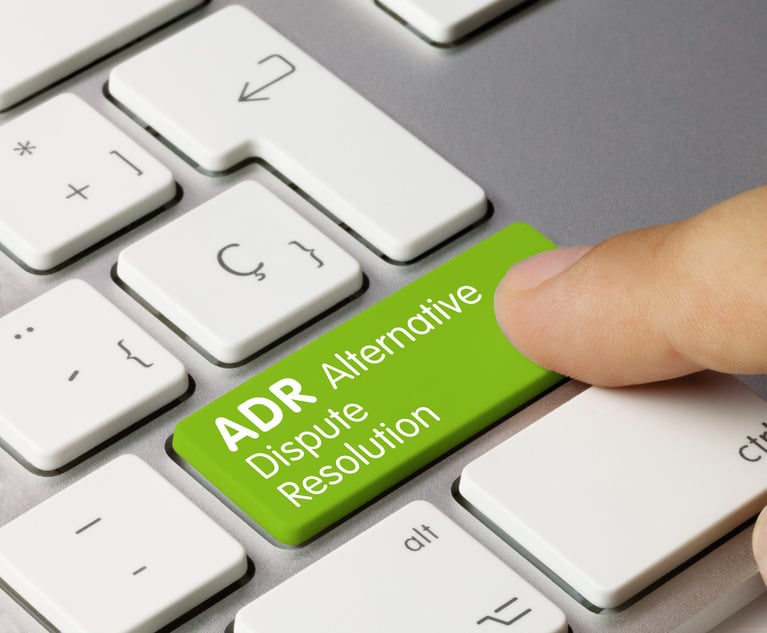 Gary Strong, left, and Elizabeth A. Napierkowski, right, of Gfeller Laurie. Courtesy photos
Gary Strong, left, and Elizabeth A. Napierkowski, right, of Gfeller Laurie. Courtesy photosDispute Resolution Boards—Getting Real Time Decisions on Construction Projects
In the construction industry, stakeholders are often looking for new ways to improve efficiency across the stages of the project, while also focusing on ways for the project to remain cost-effective. This goal can often be hindered by the threat of litigation or arbitration when disputes arise in the midst of the project. An increasingly popular solution to this problem is the use of dispute resolution boards.
January 09, 2025 at 01:00 PM
7 minute read
In the construction industry, stakeholders are often looking for new ways to improve efficiency across the stages of the project, while also focusing on ways for the project to remain cost-effective. This goal can often be hindered by the threat of litigation or arbitration when disputes arise in the midst of the project. An increasingly popular solution to this problem is the use of dispute resolution boards (DRB). DRBs are defined by the Dispute Resolution Board Foundation as "a board of impartial professionals formed at the beginning of the project to follow construction progress, encourage dispute avoidance, and assist in the resolution of disputes for the duration of the project." DRBs were first implemented in 1976 and over the past several years, the number of construction projects that implements a dispute resolution board has continued to increase. DRBs are a function of contract and are generally negotiated before the construction project begins in earnest. They are used primarily on large construction projects that have multiple phases and multiple trades and design professionals. However, as the construction industry has seen the benefit of DRBs, some have contractually negotiated on smaller size projects.
Another growing area in the construction industry is the use and implementation of artificial intelligence (AI) on construction projects. AI is a field of data science that studies and develops intelligent machines and software. It has already proven a useful tool in the development of construction projects, as well an effective time and cost saving measure. AI has helped streamline construction projects by helping developers tailor their focus on the most important aspects of the project, while increasing workplace safety and overall productivity.
NOT FOR REPRINT
© 2025 ALM Global, LLC, All Rights Reserved. Request academic re-use from www.copyright.com. All other uses, submit a request to [email protected]. For more information visit Asset & Logo Licensing.
You Might Like
View All


Arbitrators Under Fire for Allegedly Forcing Workers to 'Stay or Pay' Employers
5 minute read
Appreciating the Important Work the Middlesex County Civil Bar Panel Does
7 minute readTrending Stories
- 1Judge Finds Trump Administration Violated Order Blocking Funding Freeze
- 2CFPB Labor Union Files Twin Lawsuits Seeking to Prevent Agency's Closure
- 3Crypto Crime Down, Hacks Up: Lawyers Warned of 2025 Security Shake-Up
- 4Atlanta Calling: National Law Firms Flock to a ‘Hotbed for Talented Lawyers’
- 5Privacy Suit Targets Education Department Over Disclosure of Student Financial Data to DOGE
Who Got The Work
J. Brugh Lower of Gibbons has entered an appearance for industrial equipment supplier Devco Corporation in a pending trademark infringement lawsuit. The suit, accusing the defendant of selling knock-off Graco products, was filed Dec. 18 in New Jersey District Court by Rivkin Radler on behalf of Graco Inc. and Graco Minnesota. The case, assigned to U.S. District Judge Zahid N. Quraishi, is 3:24-cv-11294, Graco Inc. et al v. Devco Corporation.
Who Got The Work
Rebecca Maller-Stein and Kent A. Yalowitz of Arnold & Porter Kaye Scholer have entered their appearances for Hanaco Venture Capital and its executives, Lior Prosor and David Frankel, in a pending securities lawsuit. The action, filed on Dec. 24 in New York Southern District Court by Zell, Aron & Co. on behalf of Goldeneye Advisors, accuses the defendants of negligently and fraudulently managing the plaintiff's $1 million investment. The case, assigned to U.S. District Judge Vernon S. Broderick, is 1:24-cv-09918, Goldeneye Advisors, LLC v. Hanaco Venture Capital, Ltd. et al.
Who Got The Work
Attorneys from A&O Shearman has stepped in as defense counsel for Toronto-Dominion Bank and other defendants in a pending securities class action. The suit, filed Dec. 11 in New York Southern District Court by Bleichmar Fonti & Auld, accuses the defendants of concealing the bank's 'pervasive' deficiencies in regards to its compliance with the Bank Secrecy Act and the quality of its anti-money laundering controls. The case, assigned to U.S. District Judge Arun Subramanian, is 1:24-cv-09445, Gonzalez v. The Toronto-Dominion Bank et al.
Who Got The Work
Crown Castle International, a Pennsylvania company providing shared communications infrastructure, has turned to Luke D. Wolf of Gordon Rees Scully Mansukhani to fend off a pending breach-of-contract lawsuit. The court action, filed Nov. 25 in Michigan Eastern District Court by Hooper Hathaway PC on behalf of The Town Residences LLC, accuses Crown Castle of failing to transfer approximately $30,000 in utility payments from T-Mobile in breach of a roof-top lease and assignment agreement. The case, assigned to U.S. District Judge Susan K. Declercq, is 2:24-cv-13131, The Town Residences LLC v. T-Mobile US, Inc. et al.
Who Got The Work
Wilfred P. Coronato and Daniel M. Schwartz of McCarter & English have stepped in as defense counsel to Electrolux Home Products Inc. in a pending product liability lawsuit. The court action, filed Nov. 26 in New York Eastern District Court by Poulos Lopiccolo PC and Nagel Rice LLP on behalf of David Stern, alleges that the defendant's refrigerators’ drawers and shelving repeatedly break and fall apart within months after purchase. The case, assigned to U.S. District Judge Joan M. Azrack, is 2:24-cv-08204, Stern v. Electrolux Home Products, Inc.
Featured Firms
Law Offices of Gary Martin Hays & Associates, P.C.
(470) 294-1674
Law Offices of Mark E. Salomone
(857) 444-6468
Smith & Hassler
(713) 739-1250






